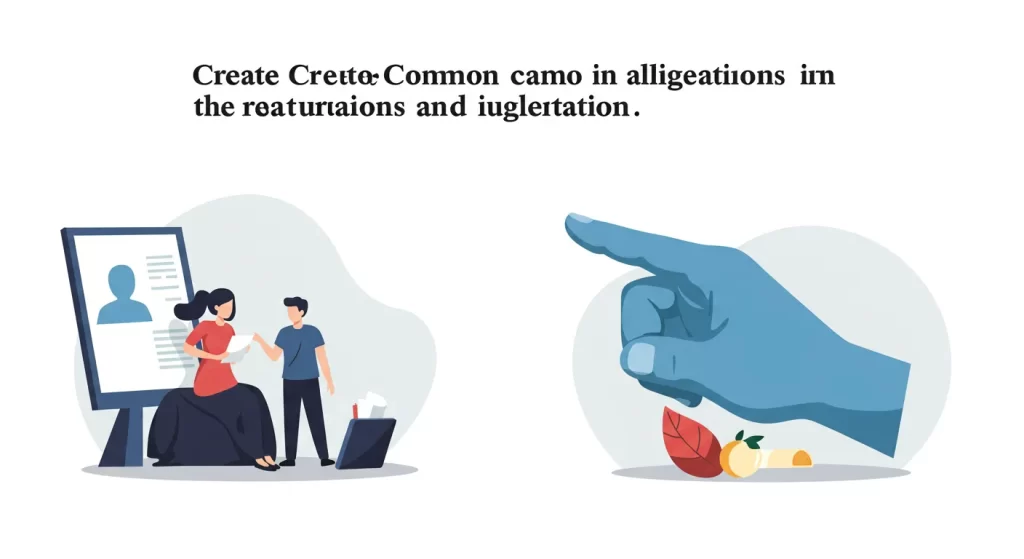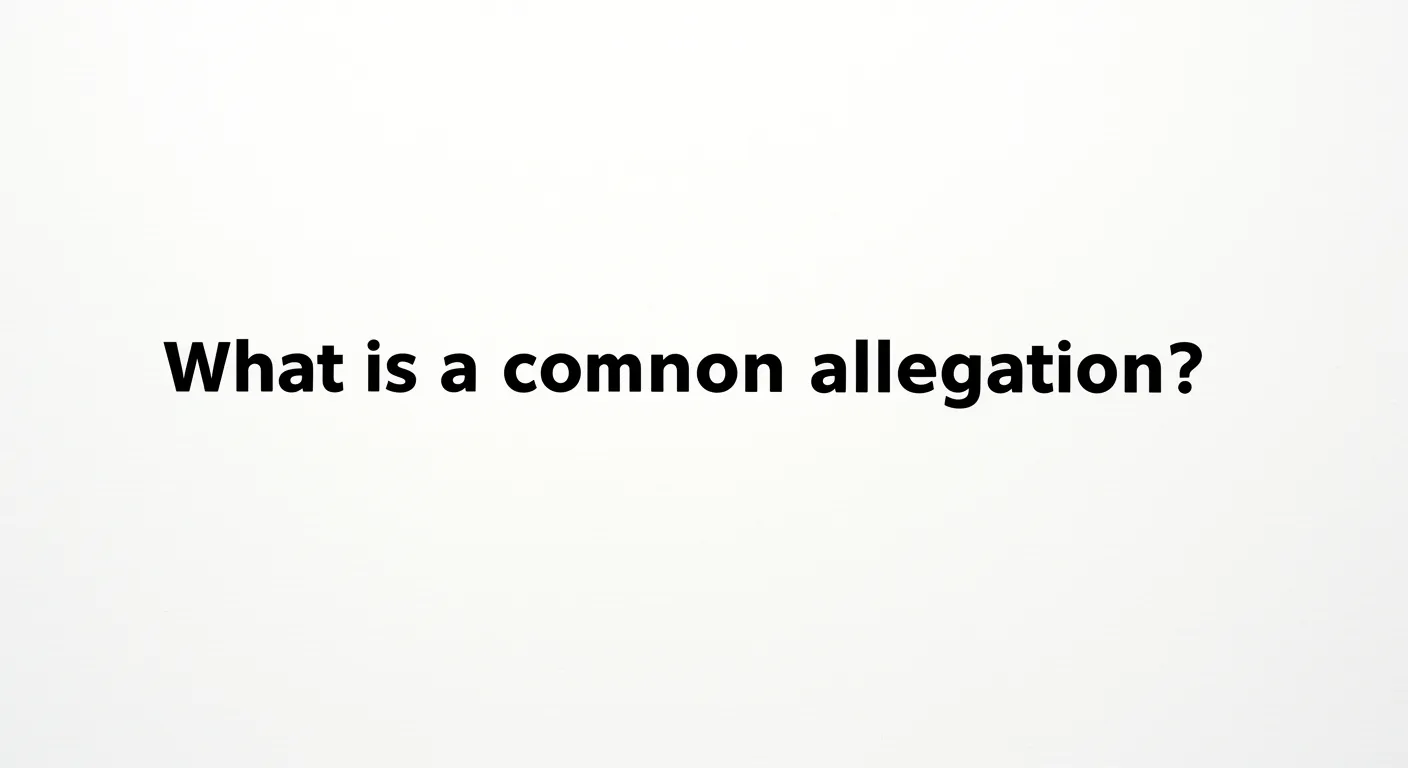Table of Contents
What Is a Common Allegation?
Allegations are common in disputes, including healthcare, workplace issues, personal conflicts, and legal matters. These assertions can significantly impact individuals, organizations, and society.
Understanding common allegations—what they are, where they arise, and their implications—is not just important, it’s empowering. This article delves into common types of allegations and their effects, providing you with the knowledge to navigate such situations with confidence. It also covers how different contexts handle them, giving you a comprehensive understanding.
Common Allegations
Allegations: Definition and Significance
An allegation is a claim, often made without proof, that something occurred. It usually involves misconduct or a breach of duty.
These claims can be made in various settings, including healthcare, the workplace, and personal relationships. Allegations are not proof of guilt, but they are important. They prompt investigations and legal proceedings to uncover the truth.
Types of Allegations: Criminal, Civil, and Personal
Allegations come in different forms depending on the situation. They can broadly be categorized into:
- Criminal Allegations: These involve accusations of illegal acts like theft, assault, or fraud. Such criminal allegations often bring in law enforcement. They can lead to formal investigations and even prosecution.
- Civil Allegations usually involve disputes between individuals or entities that center on issues like contracts, property, or negligence. Civil cases often focus on claims for compensation or remedies rather than punishment.
- Personal Allegations: These issues arise in personal relationships. They may include claims of emotional or physical abuse, such as domestic violence or harassment. Since they directly impact individuals’ well-being, they can have legal or social consequences.
Common Allegations in Different Contexts

Common Allegations in the Legal Field
In the legal context, common allegations often revolve around misconduct and negligence. For example, healthcare providers may face claims of malpractice. These include medication errors, incorrect dosages, or failure to follow treatment protocols. Lawyers, judges, and other legal professionals might also face allegations of professional misconduct, such as conflict of interest or bribery.
Common Allegations in Workplace Disputes
In workplaces, vague allegations can create confusion and complicate investigations. Allegations about harassment, discrimination, or improper conduct must be clear and specific.
Workplace investigations require that the claimant provide details of the event, such as when, where, and who was involved and what exactly transpired. However, rumors and suspicions often lead to unsubstantiated claims, which may be dismissed due to lack of evidence or reliability.
Common Allegations in Personal Relationships
Domestic violence is one of the most serious types of personal allegations. These accusations can involve assault, non-fatal strangulation, coercive behavior, or harassment.
Commonly, these allegations arise when one partner feels threatened or victimized by the other’s actions. Legal systems often treat these allegations with high priority due to the severe emotional and physical harm they may cause.
Also Read: Cubvh: Revolutionizing Connectivity for a Smarter Future
Common Allegations in Politics and Public Figures
Politicians and public figures are frequently subjected to allegations—from claims of corruption to sexual harassment.
These allegations often lead to media scrutiny and legal investigations. Due to their high-profile nature, allegations against public figures can have significant reputational and political consequences, leading to loss of public trust or legal action.
Legal Implications of Allegations
The Difference Between Allegations and Accusations
Although allegation and accusation are sometimes used interchangeably, there is a subtle difference. An allegation refers to a claim made by one party, stating that something has occurred without offering immediate proof.
On the other hand, an accusation implies a more direct charge that someone is guilty of wrongdoing and may result in formal legal action. Understanding this distinction is crucial in legal contexts, as allegations are not automatically accepted as fact but must be proven through evidence.
How Allegations Can Impact Legal Proceedings
The impact of allegations on legal proceedings is profound. An allegation may trigger a legal action, leading to a formal investigation. In criminal cases, allegations can lead to arrest or prosecution.
In civil cases, allegations may prompt lawsuits or demands for financial compensation. The burden of proof typically lies with the person making the allegation, and the accused party often has the right to defend themselves, usually with the support of legal counsel.
In civil cases, allegations may prompt lawsuits or demands for financial compensation. The burden of proof typically lies with the person making the allegation, and the accused party often has the right to defend themselves, usually with the support of legal counsel.
The Role of Evidence in Proving Allegations
Evidence plays a pivotal role in substantiating or disproving an allegation. In any legal proceeding, the party making the claim must present evidence that supports the allegation. This emphasis on evidence should reassure you about the fairness and thoroughness of the justice system.
This might include documents, witness testimony, or physical evidence. For example, in medical malpractice cases, medical records or test results may serve as crucial evidence to prove or disprove negligence allegations.
How Allegations Are Investigated and Proven

The Investigation Process: What Happens After an Allegation?
After an allegation, the process typically involves an investigation to determine its validity. Whether in healthcare, the workplace, or personal disputes, investigations generally involve gathering statements, reviewing evidence, and interviewing witnesses.
The goal is to establish whether the allegation is substantiated and to determine the appropriate course of action. In cases involving domestic violence or medical malpractice, the investigation may also involve law enforcement or regulatory bodies.
The Importance of Credibility and Reliability of Witnesses
One of the critical elements in proving or disproving an allegation is the credibility of witnesses. In many cases, witness testimony plays a crucial role.
However, witnesses must be reliable and provide factual, unbiased accounts to be useful. Any inconsistencies or contradictions in a witness’s statement can undermine the strength of the allegation.
Role of Law Enforcement in Handling Allegations
When allegations involve potential criminal conduct, law enforcement often becomes involved. Whether it’s domestic violence or workplace fraud, police or investigators may be called upon to collect evidence, interrogate the involved parties, and potentially make arrests. In healthcare-related cases, agencies like the medical board may get involved to investigate and penalize any misconduct or negligence.
Consequences of False Allegations
Legal Repercussions for False Allegations
False allegations are serious and can have severe legal consequences for the person making them. In many jurisdictions, making a false allegation can lead to criminal charges such as perjury or defamation.
If the allegation harms someone’s reputation or results in wrongful legal actions, the person who made the claim may be held legally liable for damages.
Emotional and Social Impact of False Allegations
False allegations can also have a profound emotional and social impact. The accused party may experience stress, anxiety, and damage to their personal or professional relationships.
The social stigma attached to a false allegation can often be more damaging than the legal consequences, particularly in cases of sexual harassment or workplace misconduct.
How False Allegations Affect the Accused and Society
The impact of false allegations extends beyond the immediate individuals involved. When allegations are made and later found false, they undermine trust within the community, workplaces, and families. Society suffers when people are unjustly accused, and the credibility of genuine claims may be questioned.
Preventing and Addressing Allegations

How to Protect Yourself from False Allegations
There are steps one can take to protect themselves from false allegations. Clear documentation of interactions, maintaining professional conduct, and ensuring there are reliable witnesses can help safeguard individuals from wrongful claims.
In the workplace, for example, employers should establish clear policies and training to prevent harassment and misconduct.
What to Do If You Are Accused of Something Unjustly
If someone is accused unjustly, remaining calm and seeking legal advice is crucial. One should gather evidence, such as emails, texts, or recordings that can help disprove the allegation. Cooperation with the investigation and maintaining transparency are also essential.
Legal Rights and Protections Against False Allegations
Individuals who face false allegations have legal protections, including the right to due process and the right to defend themselves. Consulting with a legal expert can help an accused person understand their rights and navigate the complex legal landscape of such cases.
Summary of Key Points
Allegations are serious claims that can arise in various situations, including healthcare, workplace disputes, and domestic conflicts. Understanding the types, implications, and processes related to allegations helps individuals navigate the complexities of these situations.
The Importance of Fairness and Justice in Allegation Cases
Ultimately, fairness and justice are paramount when handling allegations. The accuser and the accused should be allowed to present their sides fairly. The legal process ensures that allegations are appropriately investigated and proven with sufficient evidence, maintaining the justice system’s integrity.




